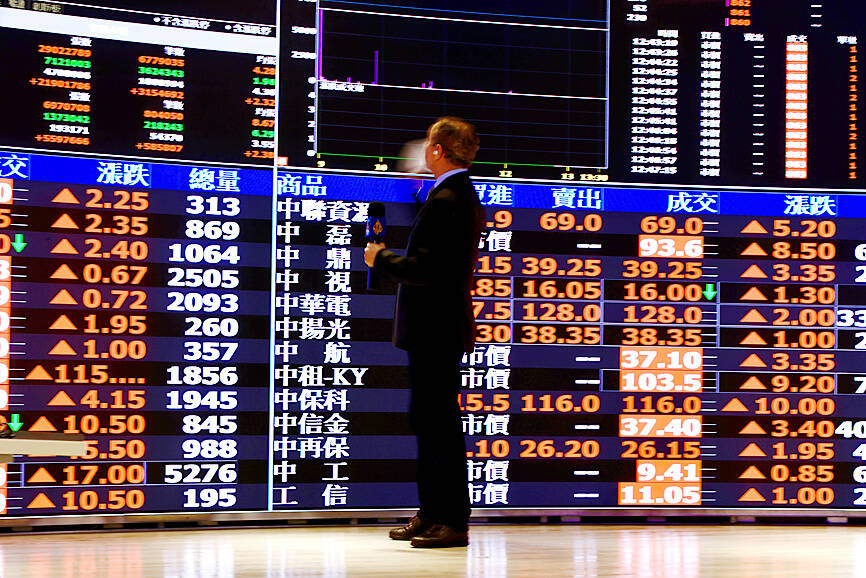Taiwanese stocks surged 9.25 percent yesterday after US President Donald Trump overnight announced a 90-day pause on his “reciprocal” tariffs for most countries, easing investor fears and fueling a global rebound.
The TAIEX opened sharply, soaring 1,615.09 points to 19,006.85, then stabilized as many stocks hit their daily 10 percent limit, capping further gains and keeping turnover on the main board modest at NT$197.494 billion (US$6.01 billion).
Heavyweight stocks Taiwan Semiconductor Manufacturing Co (台積電), Hon Hai Precision Industry Co (鴻海精密), and MediaTek Inc (聯發科) surged by their 10 percent daily limit, leading a market-wide rally as investor sentiment rebounded. The New Taiwan dollar also strengthened by as much as 0.6 percent against the US dollar — its biggest intraday jump since November last year.

Photo: RITCHIE B. TONGO, EPA-EFE
In total, 1,389 of the more than 1,870 listed companies on the Taiwan Stock Exchange and Taipei Exchange hit their limit-up prices during the session, exchange data showed.
The sharp rebound followed a three-day sell-off that had dragged the TAIEX into a bear market and saw traders rushing to reverse leveraged bets.
Analysts said the rally provided much-needed relief for battered tech stocks and helped ease concerns following recent volatility.
Elsewhere in Asia, Japan’s Nikkei 225 jumped more than 9 percent, Australia’s S&P/ASX 200 soared 4.5 percent and South Korea’s KOSPI gained 6.6 percent. Hong Kong’s Hang Seng index also added 2.1 percent and the Shanghai Composite index rose 1.2 percent.
European markets also surged in early trading, with Germany’s DAX gaining 5.3 percent, while France’s CAC 40 in Paris rose 5 percent and the UK’s FTSE 100 surged 4.0 percent.
In Taiwan, the government moved swiftly to stabilize the market following recent turbulence. In addition to tightening short-selling rules and increasing margin requirements, the Ministry of Finance on Tuesday authorized the activation of the NT$500 billion National Stabilization Fund (國安基金) to support the market.
Minister of Finance Chuang Tsui-yun (莊翠雲) yesterday said the ministry is assessing whether to expand the stabilization fund amid fallout from Trump’s tariff policy.
Chuang made the remarks at a meeting of the legislature’s Finance Committee where Democratic Progressive Party Legislator Kuo Kuo-wen (郭國文) asked whether the stabilization fund’s current resources would prove sufficient given the scale of market turmoil.
Chuang said there are early signs that the market is beginning to stabilize, adding that the ministry is assessing whether to raise the authorized amount of NT$500 billion to help ease market volatility if circumstances warrant such a move.

Intelligence agents have recorded 510,000 instances of “controversial information” being spread online by the Chinese Communist Party (CCP) so far this year, the National Security Bureau (NSB) said in a report yesterday, as it warned of artificial intelligence (AI) being employed to generate destabilizing misinformation. The bureau submitted a written report to the Legislative Yuan in preparation for National Security Bureau Director-General Tsai Ming-yen’s (蔡明彥) appearance before the Foreign Affairs and National Defense Committee today. The CCP has been using cognitive warfare to divide Taiwanese society by commenting on controversial issues such as Taiwan Semiconductor Manufacturing Co’s (TSMC, 台積電) investments in the

INVESTIGATION: The case is the latest instance of a DPP figure being implicated in an espionage network accused of allegedly leaking information to Chinese intelligence Democratic Progressive Party (DPP) member Ho Jen-chieh (何仁傑) was detained and held incommunicado yesterday on suspicion of spying for China during his tenure as assistant to then-minister of foreign affairs Joseph Wu (吳釗燮). The Taipei District Prosecutors’ Office said Ho was implicated during its investigation into alleged spying activities by former Presidential Office consultant Wu Shang-yu (吳尚雨). Prosecutors said there is reason to believe Ho breached the National Security Act (國家安全法) by leaking classified Ministry of Foreign Affairs information to Chinese intelligence. Following interrogation, prosecutors petitioned the Taipei District Court to detain Ho, citing concerns over potential collusion or tampering of evidence. The

‘COMPREHENSIVE PLAN’: Lin Chia-lung said that the government was ready to talk about a variety of issues, including investment in and purchases from the US The National Stabilization Fund (NSF) yesterday announced that it would step in to staunch stock market losses for the ninth time in the nation’s history. An NSF board meeting, originally scheduled for Monday next week, was moved to yesterday after stocks plummeted in the wake of US President Donald Trump’s announcement of 32 percent tariffs on Taiwan on Wednesday last week. Board members voted to support the stock market with the NT$500 billion (US$15.15 billion) fund, with injections of funds to begin as soon as today. The NSF in 2000 injected NT$120 billion to stabilize stocks, the most ever. The lowest amount it

NEGOTIATIONS: Taiwan has good relations with Washington and the outlook for the negotiations looks promising, Minister of Economic Affairs J.W. Kuo said Taiwan’s GDP growth this year is expected to decrease by 0.43 to 1.61 percentage points due to the effects of US tariffs, National Development Council (NDC) Minister Paul Liu (劉鏡清) said at a meeting of the legislature’s Economics Committee in Taipei yesterday, citing a preliminary estimate by a private research institution. Taiwan’s economy would be significantly affected by the 32 percent “reciprocal” tariffs slapped by the US, which took effect yesterday, Liu said, adding that GDP growth could fall below 3 percent and potentially even dip below 2 percent to 1.53 percent this year. The council has commissioned another institution